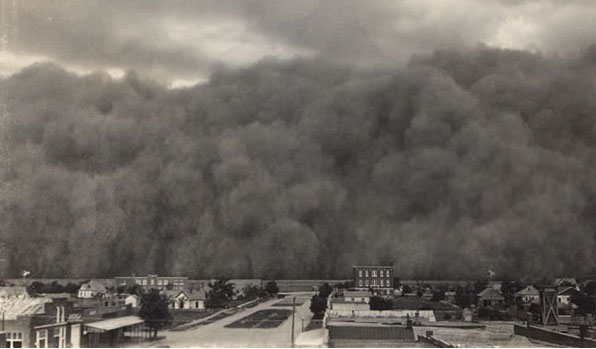Harvest Public Media recently published an interview with Dayton Duncan, writer and producer of the PBS documentary film “The Dust Bowl.” The film was directed by Ken Burns, director of the acclaimed National Parks series, The Civil War and Baseball among many others for PBS. It looks back at the Dust Bowl through the eyes of those who lived through it, with hopes of extracting lessons for the future.
From their website:
>”The Dust Bowl chronicles the worst man-made ecological disaster in American history, in which the frenzied wheat boom of the “Great Plow-Up,” followed by a decade-long drought during the 1930s nearly swept away the breadbasket of the nation.”
Dayton Duncan interviewed 26 living witnesses to the destruction of the Dust Bowl era. All were children in the 1930’s, and are now in their 80’s and 90’s. They recount hauntingly vivid memories of choking dust and crushing drought.
Duncan told HPM that the intensity of their memories are “a testament to just how catastrophic things were and therefore how burning the memories are. A great part of their life was enshrouded in this ‘brown world’ as one of them called it.” Survivors recollect siblings and relatives suffering, and sometimes dying, from what came to be known as ‘dust pneumonia.’
Since the completion of filming, 5 of the 26 survivors interviewed have died. This is one of the reasons that Duncan and Burns felt compelled to act now - in order to capture memories from witnesses to the disaster before they were gone. They hope that by learning about the history of this national tragedy, we won’t have to repeat it again.
The drought of 2012 was a poignant reminder of the fickle and increasingly unpredictable nature of weather and the effects it can have on our food supply.
Photos from the dust bowl era are incredible. Mountains of dust can be seen riding gale force winds across a bone dry prairie in almost apocalyptic imagery. Some worry that the changing climate and our need for increased food production will push the capacities of farmland past the breaking point again.
 Dust storm in Hooker, Oklahoma June 4, 1937 *Credit: Research Division of the Oklahoma Historical Society*
Dust storm in Hooker, Oklahoma June 4, 1937 *Credit: Research Division of the Oklahoma Historical Society*The history of the dust bowl is one of tragic over speculation and poor planning mixed with a string of bad luck. With the offering of cheap land to settlers in the 1900’s, the opening of a lucrative new wheat market, availability of gasoline powered farm equipment and a relatively wet period in the midwest, millions of acres of Prairie grasslands were converted into wheat fields at breakneck speed.
When the Great Depression hit, farmers hastily harvested more wheat in hopes of making money while they could, leaving wheat fields barren and exposed. Then, the wet period came to an end and a time of drought ensued. Winds hitting the open wheat fields spurred massive dust storms with millions of tons of earth being moved over a period of about 10 years.
The dust bowl offers a sobering reminder of how critical healthy soil is to food production, and while we know that conventional monocrop farming tends to leave soils depleted, on the other hand, organic farming methods typically require much more land to produce the same amount of harvest.
Recent studies like the Marsden Farm Study have shown that a combination of conventional and organic farming may hold promise for the future. We will need much more innovation and research like this in order to increase food production and decrease food waste along the supply chain.
As dust bowl survivor Wayne Lewis told the filmmakers, “We want it now – and if it makes money now it’s a good idea. But if the things we’re doing are going to mess up the future it wasn’t a good idea. Don’t deal on the moment. Take the long-term look at things. It’s important that we do the right thing by the soil and the climate. History is of value only if you learn from it.”
The Dust Bowl aired on PBS on November 18 and 19, DVD’s are now available for purchase online.
